
Feeling sad or lonely?
Disinterested, unfocused, or always feeling fatigued?
Are you concerned that your spouse is having suicidal thoughts or suffering with new, physical pains?
All of these could be signs of depression.
Depression doesn’t just affect teens. In fact, it can happen to anyone at any time at any age.
If depression is a concern for you, here are five things you need to know about it as you age, including how to spot if you or someone you love is suffering with the disorder.
-
The Symptoms Vary by Age
Feeling of sadness, loneliness, and worthlessness are the most common and easily identifiable symptoms of depression. But the symptoms can differ and change as we age.
Sadness and loneliness remain as the two key symptoms of depression. These are common in older adults who are confined to nursing homes, suffering with chronic illnesses, or grieving the death of a family member or loved one. These situations can cause us to limit social behaviors and decrease activity levels, which can make depression even worse.
Other common symptoms that adults may experience are:
- Lack of interest in once-enjoyed activities
- Lack of appetite
- Recurring thoughts about suicide and death
As we age, other symptoms may present themselves. For example, adults from age 30 to 60 commonly experience:
- Outbursts and fits of anger
- Increased drug and/or alcohol use
- Exhibiting risky behaviors
Seniors over the age of 60 may also have:
- Increased fatigue and more trouble sleeping
- Difficulty focusing
- New physical aches and pains
If you are experiencing any of these symptoms, it’s best to seek professional help. Talking with a therapist can ease the symptoms. If talk therapy doesn’t work, your mental health professional may recommend medication or other forms of treatment, such as cognitive behavioral therapy.
-
The Risk Factors Change as We Age
Depression in teenagers is often associated with feelings of inadequacy involving school, grades, peers, and sexuality. As we age, the key factors that cause depression change.
In adults over age 30, depression is often associated with:
- Financial problems, such as losing a job
- The responsibility of caring for children and/or aging parents
- Marital issues
- Worsening physical health issues
Fortunately, there are some things you can do to minimize some of those risk factors.
You can create a financial safety net by making wise investments and saving for retirement. If you lose your job, those savings can keep you afloat and reduce the stress levels that come with financial instability and sometimes make you depressed.
You can also protect yourself with a disability insurance policy. Should you suffer an illness or injury that prevents you from working and earning income, disability insurance will ensure that you still receive a portion of your pay.
For more information on disability insurance, checkout this article from Physicians Thrive.
-
There Are Different Degrees of Depression
Depression is not a one-size-fits-all disorder. Some people suffer mild forms such as seasonal affective disorder, in which symptoms present in specific months and diminish in others. Others suffer with major depressive disorder, a much more severe level of depression that can be debilitating.
It’s important to note that mild depressive states can become more intense, especially if left untreated.
-
Depression and Physical Ailments Go Hand in Hand
In addition to causing poor physical health, depression can come about as the result of poor physical health.
Why?
Because physical health and mental health go hand in hand.
Poor eating habits can cause depression, and feelings of depression can lead to poor eating habits. In some people, it’s a matter of losing weight and energy. In others, it’s a matter of overeating and becoming obese. Obesity can cause all sorts of dangerous physical problems, including coronary heart disease and type 2 diabetes.
-
There Are Ways to Avoid Depression as You Age
Taking a proactive approach to health is always better than trying to treat an illness or disease once it’s in full swing.
To minimize your risk of depression as you age, it’s important to do the following five things:
- Stay in touch with friends and loved ones
- Exercise regularly
- Maintain a healthy diet
- Practice good sleep habits
- Stay active in the community
For older or retired persons that may feel isolated or lonely, staying active in the community is key to preventing and minimizing the risks of depression. Volunteering for just a few hours per week is an excellent way to keep your mind and body active and encourage you to be more social.
In Conclusion
Depression is manageable, treatable, and preventable. By maintaining healthy habits and being proactive about your mental health, you can avoid depression altogether and find ways to beat it if you’re already in its grasp.